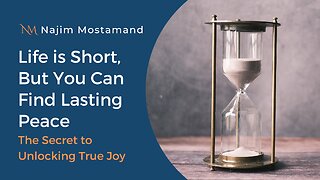Return to Your Soul – A Deep Rumi Poem on the Purpose of Life
There are a lot of ideas and theories on what is the purpose of life.
But if you listen to this deep poem, you'll see that Rumi suggests a beautiful answer to the timeless question: return to your soul.
More than just a poem to entertain, this poem sheds so much light on what we are really here for: to return Home and reunite with Source.
So, make sure you watch this video to the end to get the most out of this incredible spiritual insight.
#rumi #rumipoetry #rumipoem
---
If you are looking for more inspiration, spiritual poetry, and ancient wisdom for awakening, please subscribe to my YouTube channel and follow me on social:
https://www.youtube.com/c/NajimMostamand
Website: https://najimmostamand.com/
Instagram: https://www.instagram.com/najimmostamand/
Facebook: https://www.facebook.com/najimmostamand1/
Patreon Donation Page: https://www.patreon.com/najimmostamand
Medium: https://medium.com/@namostamand
© 2022 Najim Mostamand
---
For ages you have come and
gone courting this delusion.
For ages you have
run from the pain
and forfeited the ecstasy.
So come, return to
the root of the root
of your own soul.
Although you appear
in earthly form
Your essence is
pure Consciousness.
You are the fearless
guardian of Divine Light.
So come, return to
the root of the root
of your own soul.
When you lose
all sense of self
the bonds of a
thousand chains
will vanish.
Lose yourself
completely,
Return to
the root of the root
of your own soul.
You descended from Adam,
by the pure Word of God,
but you turned your sight
to the empty show
of this world.
Alas, how can you be
satisfied with so little?
So come, return
to the root of the root
of your own soul.
Why are you so
enchanted by this world
when a mine of gold
lies within you?
Open your eyes
and come ---
Return to
the root of the root
of your own soul.
You were born from
the rays of God's Majesty
when the stars were
in their perfect place.
How long will you
suffer from the blows
of a nonexistent hand?
So come, return
to the root of the root
of your own soul.
You are a ruby
encased in granite.
How long will you
deceive us with
this outer show?
O friend, We can see
the truth in your eyes!
So come, return
to the root of the root
of your own soul.
After one moment with
that glorious Friend
you became loving,
radiant, and ecstatic.
Your eyes were
sweet and full of fire.
Come, return
to the root of the root
of your own soul.
Shams-e Tabriz,
the King of the Tavern
has handed you
an eternal cup,
And God in all
His glory is
pouring the wine.
So come! Drink!
Return
to the root of the root
of your own soul.
Soul of all souls,
life of all life - you are That.
Seen and unseen,
moving and unmoving -
you are That.
The road that leads
to the City is endless;
Go without head and feet
and you'll already be there.
What else could you be? -
you are That.
~ Maulana Jalaluddin Rumi
---
Jalāl ad-Dīn Mohammad Rumi (1207 — 1273), also known as Jalāl ad-Dīn Mohammad Balkhī, Mowlānā, or more simply and popularly as Rumi, was a 13th-century Persian poet, scholar, philosopher, and Sufi mystic.
When Rumi was a young child, the Mongols, led by Genghis Khan, invaded Central Asia, forcing Rumi's family to escape westwards via caravan to avoid persecution and death.
When Rumi turned 25, his father passed away and he felt a deep void in his spirituality. He followed his father's footsteps and took over the role of the Islamic molvi, or Muslim doctor of law. But it wasn't until November 15, 1244, that Rumi's life turned upside down.
On this day, Rumi met the wandering dervish and mystic Shams-e Tabrizi in Damascus, who transformed Rumi from an accomplished teacher, scholar and jurist to a humble ascetic. Two years after they met, Shams abruptly left Konya.
When Shams returned, however, he disappeared shortly after, with several sources suggesting that he was murdered at the order of Rumi's son Ala-eddin. His death sent Rumi reeling into depression, and to express and cope with his bereavement, Rumi began writing hundreds of lyric poems, which altogether formed The Divan of Shams-e Tabrizi (or Book of Shams of Tabriz).
He continued to write many poems, until one of his companions, Husaam al-Din Chalabi, inspired him to produce an even greater masterpiece, which would later become the Masnavi-e Ma'navi (or "The Spiritual Couplets"). In December of 1273, Rumi fell ill and passed away days later on December 17. Many refer to the day of his passing as Shab-e Aroos (or "Wedding Night") to signify that the mystic has finally united with his Beloved.
-
 8:22
8:22
Najim Mostamand
4 days agoLife is Short, But There's Something More Permanent...
272 -
 34:03
34:03
Candace Owens
1 hour agoPiers Morgan Caught LYING About Brigitte Macron | Candace Ep 13
973 -
 LIVE
LIVE
Major League Fishing
23 hours agoLIVE Bass Pro Tour: Stage 6, Day 1
853 watching -
 LIVE
LIVE
Due Dissidence
12 hours agoTucker SHUTS DOWN Reporter's RED-BAITING, Coup Attempt in Bolivia, Journalist STUMPS State Dept Spox
2,401 watching -
 LIVE
LIVE
Matt Kohrs
12 hours agoDJT Pumps Ahead of Debate, Live Trading & Breaking Market News || The MK Show
1,491 watching -
 LIVE
LIVE
Wendy Bell Radio
6 hours agoTonight Is About How Much Joe Biden Sucks
10,814 watching -
 22:21
22:21
Stephen Gardner
14 hours ago🔴BREAKING: Putin Issues DEVASTATING WARNING to US Pentagon
63.3K192 -
 1:10:43
1:10:43
Graham Allen
3 hours agoSCOTUS BETRAYS AMERICANS AGAIN?!?! + CNN Continues To Rig Debate For Biden!!
20.2K63 -
 1:14:01
1:14:01
Steven Crowder
1 day agoThis is How Trump Beats Biden in the Debate | GUEST: Trump Spokeswoman Karoline Leavitt
412K854 -
 1:35:28
1:35:28
The Kirk Minihane Show
2 hours agoKMS Live - June 27, 2024
1.58K1